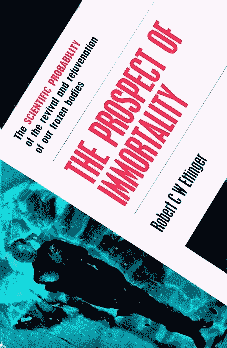
The Prospects of Immortality - Robert Ettinger
- Owner: brokenportal (View all images and albums)
- Uploaded: Jul 26 2011 07:01 PM
- Views: 2,230
- Category: Life Extension Images

http://www.cryonics.org/book1.html
Robert Ettinger, December 4, 1918 – 23 July 23, 2011 R.F.A., Rest For Awhile
This book converted a lot of people to the cause. It didnt, and I think couldnt effect change things over night, or in 5 years, or even 10 or 20, but it could and did help get the ball rolling, plant the seed of the notion in more peoples heads so it could proliferate and sprout and spread. Im quite positive, and Im sure that most if not all of us agree, that the movement wouldnt be where it is today with out it.
"The following is from the dust jacket of the British hard cover edition, 1965.
Would you like to live for ever, here on this earth? In the very near future this may become a real possibility. Indeed, in theory it is possible now, for if one was to be deep-frozen and stored away it is inevitable that in fifty, or a hundred, or a thousand years (time becomes meaningless in this context) surgery will have progressed to the point where damage to the cells which is at present irreparable will be able to be repaired. The difficulty at the moment is that present methods of freezing and unfreezing are so crude that a great deal more damage is done in the process. But this again is something which will soon be overcome.
Should it happen, and there is the possibility that the first cases are already on ice, there will clearly be innumerable complications over the religious, social, and legal status of 'corpses', not to mention the purely physical problem of storage, and the enormous economic problem of over-population which must one day result. Can a 'corpse' inherit? Can an 'ice-widow' remarry? Is it euthanasia to freeze a relation, or is it murder not to?
The Prospect of Immortality is a sober, scientific, and logical argument founded on undeniable fact: that a body deep-frozen stands a better chance of being revived than one rotting in the ground; and that many people who died fifty or a hundred year ago of 'incurable' diseases would today be cured. Mr. Ettinger has carried his thesis to its logical conclusion and examined every aspect of the consequences. Even those who are appalled by the 'prospect' will be intrigued by the argument."







































